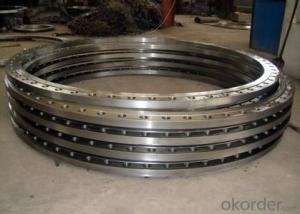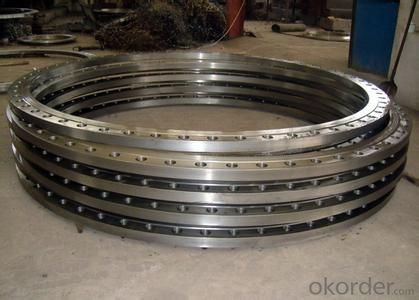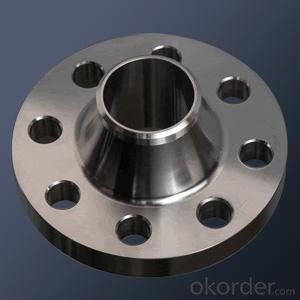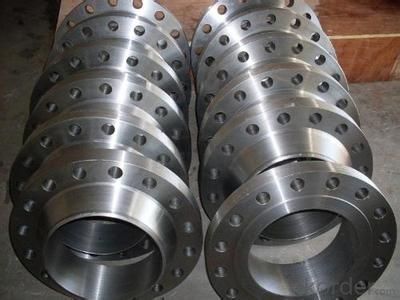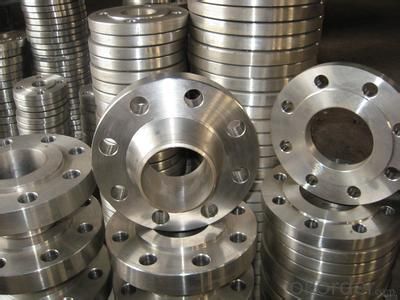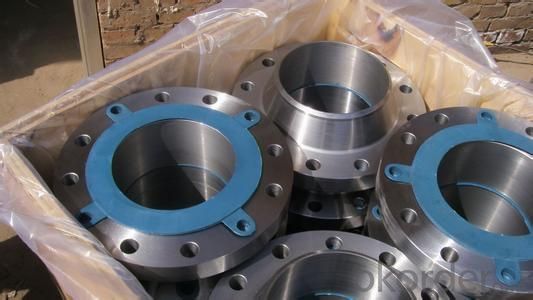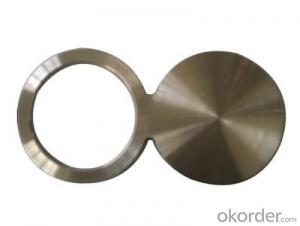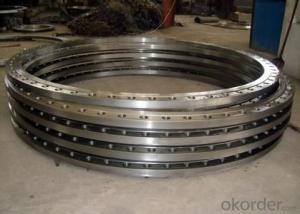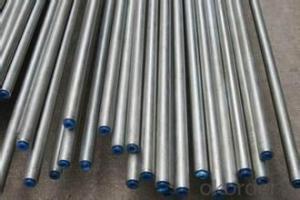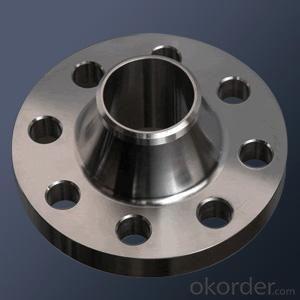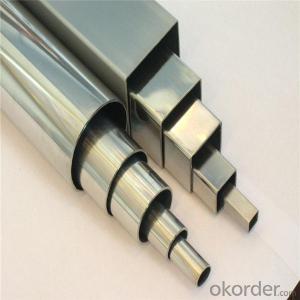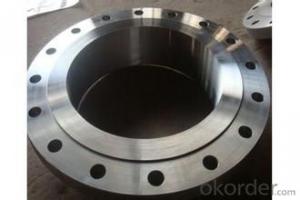STAINLESS STEEL PIPE FORGED FLANGES 304 304L 316 316L ANSI B16.5
- Loading Port:
- Tianjin
- Payment Terms:
- TT OR LC
- Min Order Qty:
- 1 pc
- Supply Capability:
- 10000 pc/month
OKorder Service Pledge
OKorder Financial Service
You Might Also Like
Package Of Stainless Steel Flange:
PACKED IN PLYWOOD CASES OR PALLETS
Painting Of Stainless Steel Flange:
ANTI-RUST OIL
Marking Of Stainless Steel Flange:
REFER TO MARKING DOCUMENT or AS PER CUSTOMER REQUEST
Shipping Marks Of Stainless Steel Flange:
EACH WOODEN BOX TWO PLASTIC SHIPPING MARKS
Specification Of Stainless Steel Flange:
Carbon Steel Flange Slip On Flange, Plate Flange, Blind Flange, Welding Neck Flange, Socket Welded Flange, Thread Flange, Lap Joint Flange, Long Welding Neck Flange
Size : 1/2"-48"
Wall Thickness.: SCH10-SCH160, SGP , XS, XXS, DIN ,STD
| Name | Stainless Steel Flange |
| Size | 1/2" - 48" |
| Face | RF, FF, RTJ |
| Wall thickness | Sch5-Sch160 XXS,STD,XS, SGP |
| Standard | ASME B16.5, B16.47, BS4504, JIS B2220, API 6A, 11Detc. |
| We can also produce according to drawing and standards provided by customers. | |
| Material | 304, 304L, 316, 316L, 304/304L, 316/316L, EN1.4301, EN1.4404 etc. |
| Packaging | Wooden Cases, wooden pallet , or carton box , or nylog bag and then in wooden cases |
| Surface Treatment | Anti-rust Oil |
| Delivery Time | 20-30 days, after received advance payment. |
| Quality | 100% Heat Treatment, No Welding repair |
| Others | 1.Special design available according to your drawing. |
| 2.anti-corrosion and high-temperature resistant with black painting | |
| 3. All the production process are made under the ISO9001:2000 strictly. | |
| 4. A conformity rate of ex-factory inspection of products. | |
| 5. we have export right , offering FOB , CNF CIF price |
STANDARD & MATERIAL GRADE
STAMDARD Of Stainless Steel Flange
<table style="WIDTH: 838px" cellspaci
- Q: Can steel pipes be used for conveying food and beverages?
- To safely transport food and beverages using steel pipes, several precautions must be taken. First and foremost, it is imperative to select stainless steel pipes that are specifically designed for handling food and beverages. These pipes are constructed with high-quality stainless steel, which is resistant to corrosion and does not release harmful substances into the food or beverage. Secondly, it is crucial to thoroughly clean and sanitize the pipes before and after each use to maintain hygiene standards. By regularly cleaning and maintaining the pipes, the accumulation of bacteria or contaminants that could potentially contaminate the food or beverage can be prevented. Furthermore, it is vital to consider the compatibility of the food or beverage with the steel pipes. Certain acidic or corrosive substances may react with the steel, leading to contamination or compromising the integrity of the pipes. In such cases, alternative materials like food-grade plastic or rubber may be more appropriate. In conclusion, while steel pipes can be utilized for conveying food and beverages, it is essential to adhere to guidelines such as using food-grade stainless steel pipes, practicing proper cleaning and sanitization, and considering the compatibility of the specific food or beverage being transported. Following these precautions will uphold the safety and quality of the food or beverage during transportation.
- Q: Can steel pipes be used for steam applications?
- Yes, steel pipes can be used for steam applications. Steel is a widely used material in steam systems due to its high strength, durability, and resistance to high temperatures and pressure. It is commonly used in industries such as power generation, refineries, and petrochemical plants for carrying and distributing steam. However, it is important to ensure that the steel pipes are properly designed, installed, and maintained to withstand the specific conditions and requirements of steam applications.
- Q: How are steel pipes used in the manufacturing of offshore wind turbines?
- Steel pipes are used in the manufacturing of offshore wind turbines for various purposes such as supporting the turbine structure, housing electrical cables, and transporting fluids like hydraulic oil and cooling water. These pipes provide structural strength, corrosion resistance, and durability, ensuring the stability and functionality of the turbines in the harsh offshore environment.
- Q: How long are the seamless tubes? Are they six meters long?
- The usual length of steel pipe is as follows: hot rolled steel pipe 3000~12000mm and cold drawn steel pipe 3000~10500mm.
- Q: Are steel pipes suitable for use in pharmaceutical industries?
- Yes, steel pipes are suitable for use in pharmaceutical industries. Steel pipes are known for their durability, strength, and resistance to corrosion, making them ideal for transporting various pharmaceutical materials and fluids safely and hygienically. Additionally, steel pipes can withstand high pressure and temperature conditions, ensuring the integrity and efficiency of pharmaceutical manufacturing processes.
- Q: Theoretical weight of 25*25*1.5 square steel tubes
- The theoretical weight of 25*25*1.5 square steel tubes is 1.075kg/m.
- Q: How are steel pipes used in the construction of water supply systems?
- Steel pipes are commonly used in the construction of water supply systems due to their durability and strength. They are often used to transport water from the source to treatment plants, as well as for distribution to homes and businesses. Steel pipes are resistant to corrosion, which ensures the quality of the water and the longevity of the system. Additionally, their high pressure-bearing capacity makes them suitable for water supply networks that require efficient and reliable transportation of water.
- Q: Can steel pipes be used for bridge construction?
- Yes, steel pipes can be used for bridge construction. Steel pipes are commonly used in bridge construction due to their high strength-to-weight ratio, durability, and ability to withstand heavy loads and harsh environmental conditions. They are often used for constructing bridge piers, supporting structures, and for carrying utilities such as water or gas pipelines across the bridge.
- Q: How are steel pipes protected against internal scaling?
- Internal coating or lining is a process employed to safeguard steel pipes from internal scaling. This entails applying a protective layer on the inside of the pipe to prevent the formation of scales or deposits. Multiple techniques are utilized for this purpose. One prevalent approach is the application of epoxy coatings. Epoxy, a resilient and corrosion-resistant material, forms a continuous barrier on the pipe's interior. It effectively hinders the accumulation of minerals and other substances that contribute to scaling. Epoxy coatings are commonly sprayed or brushed onto the inner surface of the pipe and then hardened to create a durable and smooth finish. Cement mortar lining is another method used to protect steel pipes from internal scaling. This involves applying a layer of cement mortar to the pipe's interior. The cement mortar acts as a barrier against scaling and offers additional corrosion protection. This lining process is typically employed for large-diameter pipes utilized in water distribution systems. Polyethylene (PE) lining is yet another technique deployed to safeguard steel pipes against internal scaling. PE lining necessitates the insertion of a high-density polyethylene liner into the pipe. This liner acts as a barrier against scaling and enhances fluid flow by reducing friction. PE lining is frequently used in applications that require a smooth interior surface, such as oil and gas pipelines. Apart from these methods, regular maintenance and cleaning of the pipes can also aid in preventing internal scaling. This may involve using chemical cleaning agents or mechanical cleaning techniques to eliminate any deposits that have formed on the pipe's interior surface. Overall, safeguarding steel pipes against internal scaling is vital to maintain their efficiency and prolong their lifespan. By employing various coating and lining methods, along with implementing appropriate maintenance practices, the risk of internal scaling can be significantly diminished.
- Q: Can steel pipes be used for air conditioning systems?
- Yes, steel pipes can be used for air conditioning systems. Steel pipes are commonly used in air conditioning systems for their durability, strength, and resistance to corrosion. They can effectively transport refrigerant and withstand the high pressure and temperature conditions involved in air conditioning operations.
Send your message to us
STAINLESS STEEL PIPE FORGED FLANGES 304 304L 316 316L ANSI B16.5
- Loading Port:
- Tianjin
- Payment Terms:
- TT OR LC
- Min Order Qty:
- 1 pc
- Supply Capability:
- 10000 pc/month
OKorder Service Pledge
OKorder Financial Service
Similar products
Hot products
Hot Searches
Related keywords
